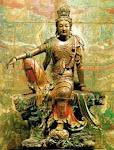In his book 'Interbeing', Thich Nhat Hanh, a Vietnamese Buddhist Monk who had been working in building a better society in his country and the world, stated fourteen precepts to follow in order to construct a more just and kind society. This 'engaged Buddhism', or the use of Buddhist's basic ideas in everyday actions is a key element to every buddhist practitioner; even more, if christians, muslims, hindus and any person could apply the values of love and compassion present within their own religious traditions or ethics in all interpersonal relations, we can surely construct a better world. Therefore, these fourteen precepts are useful for every person who is asking how can I (a simple human being) can make a difference in this world?
The first precept is: Do not be idolatrous about or bound to any doctrine, theory, or ideology, even Buddhist ones. Buddhist systems of thought are guiding means; they are not absolute truth. One of the major causes of conflicts between religious practitioners is the attachment to dogmatic ideas and values. This doesn't mean that is wrong to have strong convictions or well-rooted values, but to the danger of thinking that one have the absolute truth, the definite god or divinity, the ultimate understanding of the world and beyond. This precepts invites us to question our own ideas and doctrines and always keep in mind that other people can find other paths of spiritual development. Even more, the diversity of religious philosophies should be seen as manifestations of the great diversity human's thoughts and expressions, without forgetting that we all share a basic common denominator: we are sentient beings and we are looking for happiness (to end our suffering). Therefore, we all have the right to follow a path that leads to our liberation of suffering but we also have the obligation to respect other's path. Ultimately, if we hate others we can never find liberation from suffering, becuase the one who loves others loves himself/herself and viceversa. It is an interdepent relation between sentieng beings.
In addition, following the process of questioning our own beliefs, for our own good we have to be honest with ourselves and feel free to change our previous conceptions and ideas. This does not only refers to religious ideas but every perception, idea and understanding about us and the world. We are free to choose what we believe and how to express it. If we do not give us the chance to change then we are carrying our own burden of attachment, a heavy weight that will stop us to reach a higher level of spiritual development.
Therefore, religious or secular doctrines are only means to achieve an end; and we should question them thinking: do this lead me to achieve happiness with myself and others? If the answer is positive, then we should follow that path with renewed faith; if the answer is negative, then we should ask ourselves why and, more importantly, be brave enough to look for answers even in those places (religions or philosophies) that we previously reject due to a blind attachment to dogmatic thoughts.
This first precept is then to be free of attachment to any idea or doctrine, even to those who will help you to attain Enlightement. Why? because in order to attain that state of conciousness, of great bliss, of heavenly peace, of voidness, one should be able to be empty of all attachments. So as the eagle cannot fly beyond the earthly mountains and sail the heavenly skies with a big rock attached to its wings; we cannot sail to the land of liberation with the heavy burden of attachments to ideas, places, people and even to our own idea of existence.
Wednesday 21 October 2009
Subscribe to:
Posts (Atom)
